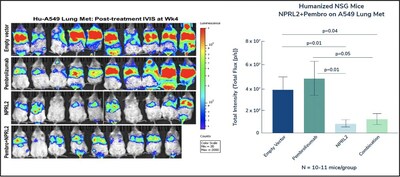Genprex Collaborators Publish Positive Preclinical Data with NPRL2 Gene Therapy Utilizing Oncoprex® Delivery System
NPRL2 Gene Therapy Induces Anti-Tumor Activity in Anti-PD1 Resistant KRAS/STK11 Mutant Non-Small Cell Lung Cancer in a Humanized Mouse Model
Provides Additional Preclinical Validation of Oncoprex® Delivery System With Another Tumor Suppressor Gene
NPRL2 is a tumor suppressor gene whose expression is reduced in many cancers including lung, renal, colorectal, glioma, gastric, and hepatocellular carcinoma, and it has been closely correlated with poor clinical outcomes.
Genprex's Oncoprex® Delivery System is a novel non-viral approach that utilizes lipid-based nanoparticles in a lipoplex form to deliver tumor suppressor genes deleted during the course of cancer development. The platform allows for the intravenous delivery of various tumor suppressor genes, and potentially other genes, to achieve a therapeutic affect without the risk of toxicity often associated with viral delivery systems. Genprex believes this system allows for delivery of a number of cancer-fighting genes, alone or in combination with other cancer therapies, to combat multiple types of cancer.
The manuscript, titled, "NPRL2 gene therapy induces effective anti-tumor immunity in KRAS/STK11 mutant anti-PD1 resistant metastatic non-small cell lung cancer (NSCLC) in a humanized mouse model," was published on the bioRxiv biology preprint server.
"These positive preclinical data are very encouraging and support NPRL2 gene therapy as a potential treatment for a sub-group of NSCLC in which patients traditionally are resistant to existing therapies," said Rodney Varner, President, Chairman and Chief Executive Officer at Genprex. "We believe this data could support the potential for a new drug candidate in our pipeline, and it also provides further evidence that the Oncoprex® Delivery System has the ability to be successful using genes other than the TUSC2 gene we are already using in clinical trials with Reqorsa®."
The studies evaluated the intravenous injection of NPRL2 gene-loaded cationic lipoplexes (DOTAP-NPRL2) with or without anti-PD1 drugs (pembrolizumab). The studies used a KRAS/STK11 mutant anti-PD1 insensitive cell line, as well as syngeneic mouse LLC2 tumors, which are also anti-PD1 resistant. In both of these mouse models, NPRL2 showed a significantly strong anti-tumor effect whereas anti-PD1 (pembrolizumab) was not effective. The anti-tumor effect was greater in humanized mice than non-humanized mice, suggesting that an immune response contributed to anti-tumor activity.
Additionally, a dramatic anti-tumor effect was mediated by NPRL2 treatment with or without a pembrolizumab combination. Bioluminescence imaging on mice showed that 7 out of 10 mice contained an extremely low amount of tumor burden in the NPRL2 treatment group, which was significantly different than in the control or pembrolizumab group.
Unlike previous experiments with Reqorsa® Immunogene Therapy (quartusugene ozeplasmid), the Company's lead drug candidate using the TUSC2 tumor suppressor gene, the anti-tumor efficacy of DOTAP-NPRL2 did not involve Natural Killer (NK) cells. The studies also found that tumors with stable NPRL2 expression exhibited significantly slower growth compared to controls. In conclusion, researchers reported that NPRL2 gene therapy induces anti-tumor activity through dendritic cell-mediated antigen presentation and cytotoxic immune cell activation.
About Genprex, Inc.
Genprex, Inc. is a clinical-stage gene therapy company focused on developing life-changing therapies for patients with cancer and diabetes. Genprex's technologies are designed to administer disease-fighting genes to provide new therapies for large patient populations with cancer and diabetes who currently have limited treatment options. Genprex works with world-class institutions and collaborators to develop drug candidates to further its pipeline of gene therapies in order to provide novel treatment approaches. Genprex's oncology program utilizes its systemic, non-viral Oncoprex® Delivery System which encapsulates the gene-expressing plasmids using lipid-based nanoparticles in a lipoplex form. The resultant product is administered intravenously, where it is taken up by tumor cells that then express tumor suppressor proteins that were deficient in the tumor. The Company's lead product candidate, Reqorsa® Immunogene Therapy (quaratusugene ozeplasmid), is being evaluated in three clinical trials as a treatment for NSCLC and SCLC. Each of Genprex's three lung cancer clinical programs has received a Fast Track Designation from the FDA for the treatment of that patient population, and Genprex's SCLC program has received an FDA Orphan Drug Designation. Genprex's diabetes gene therapy approach is comprised of a novel infusion process that uses an AAV vector to deliver Pdx1 and MafA genes directly to the pancreas. In models of Type 1 diabetes, GPX-002 transforms alpha cells in the pancreas into functional beta-like cells, which can produce insulin but may be distinct enough from beta cells to evade the body's immune system. In a similar approach, GPX-002 for Type 2 diabetes, where autoimmunity is not at play, is believed to rejuvenate and replenish exhausted beta cells.
Interested investors and shareholders are encouraged to sign up for press releases and industry updates by visiting the Company Website, registering for Email Alerts and by following Genprex on Twitter, Facebook and LinkedIn.
Cautionary Language Concerning Forward-Looking Statements
Statements contained in this press release regarding matters that are not historical facts are "forward-looking statements" within the meaning of the Private Securities Litigation Reform Act of 1995. These forward-looking statements are made on the basis of the current beliefs, expectations and assumptions of management, are not guarantees of performance and are subject to significant risks and uncertainty. These forward-looking statements should, therefore, be considered in light of various important factors, including those set forth in Genprex's reports that it files from time to time with the Securities and Exchange Commission and which you should review, including those statements under "Item 1A – Risk Factors" in Genprex's Annual Report on Form 10-K for the year ended December 31, 2023.
Because forward-looking statements are subject to risks and uncertainties, actual results may differ materially from those expressed or implied by such forward-looking statements. Such statements include, but are not limited to, statements regarding: Genprex's ability to advance the clinical development, manufacturing and commercialization of its product candidates in accordance with projected timelines and specifications; the timing and success of Genprex's clinical trials and regulatory approvals; the effect of Genprex's product candidates, alone and in combination with other therapies, on cancer and diabetes; Genprex's future growth and financial status, including Genprex's ability to maintain compliance with the continued listing requirements of The Nasdaq Capital Market and to continue as a going concern and to obtain capital to meet its long-term liquidity needs on acceptable terms, or at all; Genprex's commercial and strategic partnerships, including those with its third party vendors, suppliers and manufacturers and their ability to successfully perform and scale up the manufacture of its product candidates; and Genprex's intellectual property and licenses.
These forward-looking statements should not be relied upon as predictions of future events and Genprex cannot assure you that the events or circumstances discussed or reflected in these statements will be achieved or will occur. If such forward-looking statements prove to be inaccurate, the inaccuracy may be material. You should not regard these statements as a representation or warranty by Genprex or any other person that Genprex will achieve its objectives and plans in any specified timeframe, or at all. You are cautioned not to place undue reliance on these forward-looking statements, which speak only as of the date of this press release. Genprex disclaims any obligation to publicly update or release any revisions to these forward-looking statements, whether as a result of new information, future events or otherwise, after the date of this press release or to reflect the occurrence of unanticipated events, except as required by law.
Genprex, Inc.
(877) 774-GNPX (4679)
GNPX Investor Relations
investors@genprex.com
GNPX Media Contact
Kalyn Dabbs
media@genprex.com
![]() View original content to download multimedia:https://www.prnewswire.com/news-releases/genprex-collaborators-publish-positive-preclinical-data-with-nprl2-gene-therapy-utilizing-oncoprex-delivery-system-302105455.html
View original content to download multimedia:https://www.prnewswire.com/news-releases/genprex-collaborators-publish-positive-preclinical-data-with-nprl2-gene-therapy-utilizing-oncoprex-delivery-system-302105455.html
SOURCE Genprex, Inc.









